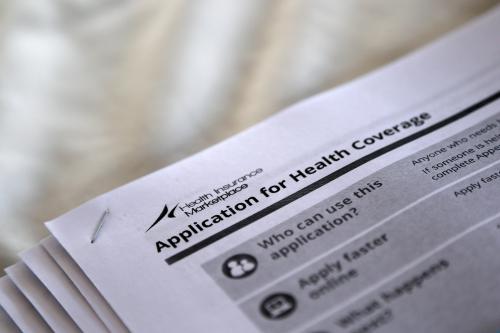This article was originally posted on Real Clear Health on January 16, 2017.
Now that the Republicans control both the presidency and both houses of Congress, they must put up or shut up on their promise to repeal and replace Obamacare. Here is a flat-footed prediction: the effort will fail for three reasons. First, the Affordable Care Act (aka the ACA or Obamacare) has largely succeeded not failed, as president-elect Trump and other Republicans falsely allege. Second, it is impossible for the stated goals of repeal to be achieved. Finally, the political fallout from the consequences of partial or total repeal would be devastating. When it comes to casting votes, enough Republicans will conclude that repeal is a bad idea and will join Democrats to sustain the basic structure of the health reform law.
First, let’s review the facts on Obamacare’s success. Tens of millions of people are newly insured. Even so, and whatever the reason, health care spending is better controlled than it has been for decades. Enrollments in the ACA’s health marketplaces in 2017 are up. Insurance companies, who raised premiums this year, are expected to make money for the foreseeable future and continue to sell insurance in those market places. These facts contradict the claims of president-elect Trump and other Republicans that the marketplaces will collapse. More and more states, including some with Republican governors, are opting to expand Medicaid eligibility as authorized by the law. Quality indicators are improving. Those facts spell success, not failure.
Second, the stated objectives of repealing Obamacare are mutually inconsistent. Three provisions comprise the core of Obamacare. First, rules barring insurance companies from refusing to sell insurance to people because of preexisting conditions or varying premiums based on those conditions. Second, a requirement that everyone carry health insurance who can afford it. And third, subsidies for those with moderate incomes to help make such insurance affordable. The law contains many other provisions as well, but these three are core.
Most ACA opponents call for complete repeal. In particular, they would repeal the mandate and curtail or eliminate the subsidies that make insurance affordable for people with low or moderate incomes. At the same time, they pledge to retain the regulations on insurers and a few other elements. But the insurance regulations are sustainable only if both the healthy, who cost less to insurers, and the sick, who cost more, carry health insurance. And without the mandate and the subsidies, young and relatively healthy customers are much less likely to reach into their pockets to pay for coverage than older and sicker patients. The result? Ever higher premiums, insurance company bankruptcy, or both.
Repealing only the provisions of Obamacare that opponents don’t like won’t work. So, they promise a replacement. But after six years of trying, they have passed a budget resolution pledging repeal, but they haven’t come up with an agreed alternative and, brave words notwithstanding, there is no indication that they ever will.
Now, Donald Trump and at least one of his close advisors have made the problem even harder. President-elect Trump says that he will only accept a “policy that will broaden health care access, make healthcare more affordable and improve the quality of the care available to all Americans.” Designated White House Counselor, Kellyanne Conway says “We don’t want anyone who currently has insurance not to have insurance.”
So the goals are at least as much coverage and no increase in out-of-pocket costs without requiring people to carry insurance or spending any more to make it affordable. Is there any way to achieve these objectives all at once? The answer, quite simply, is “no, not now, and not ever.”
One can try to conceal this impossibility by enacting repeal now but delaying implementation, so-called “repeal and delay.” But if any part of the repeal agenda takes effect immediately, such as ending the individual mandate, the market for individually purchased insurance will immediately unravel, leaving an estimated 4.3 million currently insured people without coverage. The reason is that the young and the healthy will disproportionately drop coverage, triggering the upward premium spiral. Without a replacement plan, repeal of Obamacare will add an estimated 30 million people to the ranks of those who have no health insurance. Some conservative analysts, including Joseph Antos, James Capretta, and Stuart Butler understand fully that ‘repeal and delay’ threatens chaos and warn against it.
Elected Republican officials are belatedly awakening to this risk. Five Republican Senators have proposed a two-month delay on the vote to repeal Obamacare, giving the Trump administration more time to “outline its priorities.” Another Republican Senator, Lamar Alexander wants to wait even longer; and yet another, Tom Cotton, has announced his opposition to repeal without an agreed replacement. The chairman of the House Freedom Caucus also said he wants to see more details about an Obamacare replacement before voting on repeal. Some Republican governors in states that expanded Medicaid are raising concerns about repealing that element of Obamacare.
Full repeal of Obamacare would take 60 Senate votes to overcome a virtually certain Democratic filibuster. Repeal of only those Obamacare provisions involving spending and taxes can be enacted under Senate procedures barring filibusters with only 51 votes. As there are only 52 Republican Senators, they cannot afford more than one defection if Democrats remain united. With the likely defection of at least a few Republican senators, the possibility of even partial repeal is fading.
The president-elect and other Obamacare opponents are in for a dose of humiliation as they realize belatedly that the promises they have been making for six years are empty. The primary question now is how they can salvage something from the process. They can do so by returning to a principle that Republicans have long embraced: the idea that states should be given some latitude under our federal system to pursue national objectives in somewhat different ways — to act, in Justice Louis Brandeis’ words, as “laboratories of democracy.” Section 1332 of the Affordable Care Act authorizes waivers so that each state can vary certain specific provisions in ways consistent with the overall objectives of the law. Interpretation of such titles is always subject to considerable executive discretion. The Trump administration can be expected to interpret this authority broadly. Congress might expand it further. Given flexibility on how to achieve the goals of the ACA, some states would narrow coverage while others might broaden it. As with cash assistance to the poor (Supplemental Security Income), health benefits for the poor (Medicaid), and the unemployed (Unemployment Insurance), coverage would differ from state to state.
Such an outcome is undesirable because there is no good reason why people’s health insurance should depend on where they live. But it would, however, preserve most of the remarkable gains that have flowed from the Affordable Care Act. It would spare opponents of Obamacare the ignominy of gross impotence after years of trumpeting their determination to repeal the law. And it would permit them to claim, correctly, that they had left their stamp on this landmark legislation in a way consistent with Republican principles.
The Brookings Institution is committed to quality, independence, and impact.
We are supported by a diverse array of funders. In line with our values and policies, each Brookings publication represents the sole views of its author(s).









Commentary
Op-edWhy Republicans can’t – and won’t – repeal Obamacare
January 17, 2017